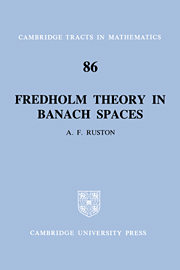Book contents
- Frontmatter
- Contents
- Preface
- 1 Introduction
- 2 Asymptotically quasi-compact operators and the Riesz theory
- 3 Tensor products of normed spaces
- 4 Fredholm theory for operators of finite rank
- 5 Operators with a Fredholm determinant
- 6 Fredholm formulae and the Riesz theory
- 7 Fredholm formulae for special classes of operators
- 8 Notes and Comments
- Bibliography
- Index of notations
- Subject index
8 - Notes and Comments
Published online by Cambridge University Press: 16 October 2009
- Frontmatter
- Contents
- Preface
- 1 Introduction
- 2 Asymptotically quasi-compact operators and the Riesz theory
- 3 Tensor products of normed spaces
- 4 Fredholm theory for operators of finite rank
- 5 Operators with a Fredholm determinant
- 6 Fredholm formulae and the Riesz theory
- 7 Fredholm formulae for special classes of operators
- 8 Notes and Comments
- Bibliography
- Index of notations
- Subject index
Summary
Introduction
The classical Fredholm theory is due to Erik Ivar Fredholm (1866–1927), after whom it is named. The first recorded reference to the theory appears to be in his letter (1899) to Mittag-Leffler, dated 8 August. A short account of his theory was given in (Fredholm, 1980; cf. also 1902a, b). The definitive account appeared in (Fredholm, 1903; cf. Fredholm, 1930, pp. viii–ix; Bôcher, 1914, p. 25; Whittaker & Watson, 1927, p. 213; Hellinger & Toeplitz, 1927, p. 1354). Other accounts of the theory are given, for instance, in (Bôcher, 1914, pp. 29–46; Goursat, 1923, pp. 368–438; 1964, pp. 46–116; Lovitt, 1924, pp. 23–72; Courant & Hilbert, 1924, pp. 99–141; 1931, pp. 96–138; 1953, pp. 112–63; Hellinger & Toeplitz, 1927, pp. 1370–6; Kowalewski, 1930, pp. 91–247; Smithies, 1958, pp. 65–78; Zabreyko et al, 1975, pp. 26–56). Most of these accounts deal only with real functions and real Fredholm-kernels, but the transition to complex functions and complex Fredholm-kernels is routine.
The word ‘function’ is currently used with various shades of meaning. We shall follow Moss & Roberts (1968, p. 13). In this connection, if φ is a function from a set S to a set T, then I call S the source, and T the destination, of φ.
- Type
- Chapter
- Information
- Fredholm Theory in Banach Spaces , pp. 214 - 249Publisher: Cambridge University PressPrint publication year: 1986

